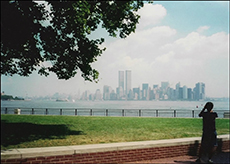The bombing of Sarajevo's National Library and the burning of its ancient books. The looting of the Iraqi National Museum and destruction of its priceless historical objects. The beheading of Kahled al-Asaad, long-time lead archaeologist for the UNESCO World Heritage Site of the Syrian city of Palmyra for refusing to give up hidden artifacts. In the "cradle of civilization" and beyond, the last century has seen the rise of cultural destruction: the intentional annihilation of irreplaceable artwork, artifacts, historical sites in desperate attempts to erase collective history and identity.
When cultural destruction is wrought, do victims have any legal recourse? Back in 1933, Raphael Lemkin, a young Polish lawyer, proposed that the destruction of cultural heritage legally become an international crime. In 1946, the United Nations included genocide as a war crime, but omitted the cultural dimension, which Lemkin considered essential. Finally, in March 2016, the International Criminal Court (ICC) charged Ahmad al-Faqi al-Mahdi, who is linked to al-Qaeda, for destroying holy and historic sites in Timbuktu, Mali. Lemkin's voice can be heard in the language of today's international law and justice.
Directed by acclaimed filmmaker Tim Slade and narrated by Tony Award-winning actress Sophie Okonedo, this powerful documentary proposes hope: As crimes of cultural destruction are increasingly reported, perpetrators can be brought to justice and awareness can grow. Increasingly, the power of modern technology can be harnessed to document, protect, and to play a role in the rebuilding process. THE DESTRUCTION OF MEMORY introduces heroes who risked their lives to protect not their cultural identity, safeguarding an invaluable record of who we are. It uses meticulous research and compelling interviews to examine how and why cultural destruction has happened, and how the work to protect, salvage and rebuild can respond.

Distinguished international experts interviewed in THE DESTRUCTION OF MEMORY include Irina Bokova, Director-General of UNESCO; Fatou Bensouda, prosecutor for the International Criminal Court; Gunter Blobel, Nobel Laureate; Bonnie Burnham, President Emerita of the World Monuments Fund; Daniel Libeskind, architect; Dirk Moses, genocide historian; Andras RiedlmayerCorine Wegener, Cultural Heritage Preservation Officer of The Smithsonian Institution, Robert Bevan, architect and author of the book "The Destruction of Memory: Architecture at War" upon which the film is based, and more.
"Beautiful and important; needs to be widely seen." —Karima Bennoune, United Nations
"The film has great pedagogical value for anthropology and archaeology courses, and will serve generations to come as a permanent record of the history of destruction as well as of preservation efforts and the importance of cultural heritage of all sorts." —Peter S. Allen, American Anthropologist
"Highly Recommended! Looks at cultural destruction throughout the 20th-century; beautiful and powerful." —Laurie Frey, The Heritagist
"This film should become not just an 'eye opener' but a vehicle for change all around the world." —Tsipi Ben-Haim, CityArts NYC
"A poignant film; necessary viewing." —Jan-Carlos Kucharek, RIBA Journal
"A measured indictment of the failure of international bodies to [offer] legal protection to important buildings in war zones." —Gillian Darley, The London Review of Books
"A complex and often heartbreaking documentary showing humankind at some of its worst, this is highly recommended." —P. Hall, Video Librarian
Grand Prize, Arkhaios Cultural Heritage and Archaeology Film Festival 2017
Audience Award, Arkhaios Cultural Heritage and Archaeology Film Festival 2017
Best Public Educational Value, The Archaeology Channel International Film Festival 2017
Best Film Honorable Mention, The Archaeology Channel International Film Festival 2017
